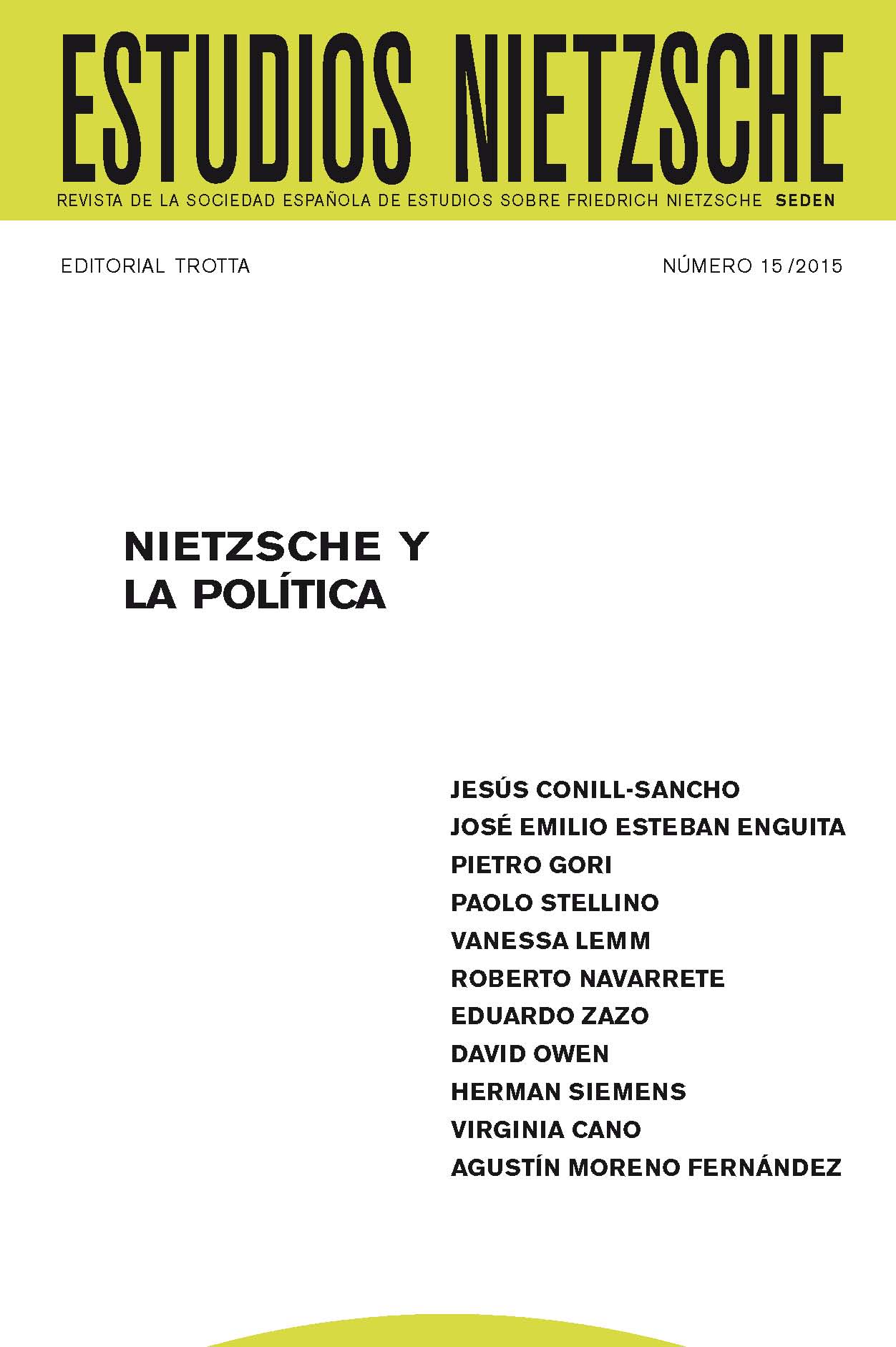Hermeneutic Neurophysiology of power and the irresistible democratization of Europe, according to Nietzsche’s vision of politics
DOI:
https://doi.org/10.24310/EstudiosNIETen.vi15.10784Keywords:
physiology, hermeneutics, democracy, politicsAbstract
The main purposes of this article are the following: first, to show that physiology (including neurophysiology) of power has hermeneutic character and political relevance in Nietzsche’s thought; and, second, to deal with the meaning of the irresistible democratization of Europe, through the analysis of its consequences, especially the sovereign power of popular will and the death of the state. Finally, it is required to introduce Nietzsche’s new
sense of the «great politics» as an alternative to the nihilist age of modern democracy.
Downloads
Metrics
References
Abel, Günter , Sprache, Zeichen, Interpretation, Frankfurt: Suhrkamp, 1999.
Abel, Günter, Interpretationswelten, Frankfurt: Suhrkamp, 1993.
Abel, Günter, “Logik und Ästhetik”, Nietzsche-Studien 16 (1987), 112-148.
Abel, Günter, Nietzsche, Berlin: de Gruyter, 1984.
Ansell-Pearson, Keith, An Introduction to Nietzsche as political thinker. The perfect nihilist, Cambridge: Cambridge University Press, 1994.
Appel, F., Nietzsche contra Democracy, Ithaca: Cornell University, 1999.
Baeumler, Alfred, Nietzsche, der Philosoph und Politiker, Leipzig: Reclam, 1931.
Changeux, Jean-Pierre, Sobre lo verdadero, lo bello y el bien, Buenos Aires: Katz, 2010.
D’Iorio, Paolo, La Linea e il Circolo. Cosmologia e filosofia dell’ eterno ritorno in Nietzsche, Genova: Pantograf, 1995.
Djuric, M und J. Simon (Hrsg.), Zur Aktualität Nietzsches, Bd. II, Würzburg, 1984.
Djuric.M., (Hrsg.), Nietzsches Begriff der Philosophie, Würzburg: Königshausen und Neumann, 1990.
Figl, Johann, Interpretation als philosophisches Prinzip, Berlin/New York: Walter de Gruyter, 1982;.
Gentili, Carlo, Nietzsche, Madrid: Biblioteca Nueva, 2004, pp. 410-425.
González Varela, Nicolás, Nietzsche contra la democracia, Barcelona: Montesinos, 2010.
Hatab, Lawrence J., A Nietzschean Defense of Democracy, Chicago: Open Court, 1995.
J. Maienschein, J., y M. Ruse (eds.), Biology and the Foundations of Ethics, Cambridge: Cambridge University Press, 1999.
Jesús Conill, Jesús, El poder de la mentira. Nietzsche y la política de la transvaloración, Madrid: Tecnos, 1997.
Nietzsche, F., Obras Completas, I-IV (OC ). Director ed. Diego Sánchez Meca. Madrid: Tecnos, 2011-2016.
Nietzsche, F., Correspondencia I-VI. (CO). Director ed. Luis E. de Santiago Guervós. Madrid : Trotta, 2005- 2012.
Nietzsche, F., Fragmentos Póstumos I-IV (FP). Director ed. Diego Sánchez Meca. Madrid: Tecnos, 2006-2010.
Olivier, Abraham, «Nietzsche and Neurology», Nietzsche-Studien 32 (2003), 124-141.
Ottmann, Henning, (Hrsg.), Nietzsche-Handbuch, Stuttgart: Metzler, 2000.
Ottmann, Henning, Philosophie und Politik bei Nietzsche, Berlin: de Gruyter, 1999.
Simon, Josef, Philosophie des Zeichens, Berlin,:Walter de Gruyter, 1989
Sommer, A. U., Friedrich Nietzsches «Der Antichrist». Ein philosophischer-historischer Kommentar, Basel: Schwabe, 2000.
Strong, Tracy B., F. Nietzsche and the Politics of Transfiguration, Berkeley: University of California Press, 1975.
Tuncel, Yunus, Agon in Nietzsche, Milwankee, Wisconsin: Marquette University Press, 2013.
Wagner, Astrid, Kognitive Dimensionen ästhetischer Erfahrung. Eine Untersuchung im Ausgang von Kants ‘Kritik der Urteilskraft’, Berlin: Parerga, 2008.
Warren, Mark, Nietzsche and Political Thought, MIT, 1988.
Downloads
Published
How to Cite
Issue
Section
License
As of issue 21 (2021) this journal is published only in open access (diamond route).
From that number 21, like the previous numbers published in NIETZSCHE STUDIES, they are subject to the Creative Commons Acknowledgment-NoComercia-ShareIgual 4.0 license, the full text of which can be consulted at <http://creativecommons.org/licenses/by-nc-sa/4.0 >
It is the responsibility of the authors to obtain the necessary permissions of the images that are subject to copyright.
This work is licensed under a Creative Commons Attribution-NonCommercial-ShareAlike 4.0 International License.
Copyright generates two different rights: moral rights and patrimonial rights that EJFB recognizes and respects. Moral rights are those relating to the recognition of the authorship. They are rights of a personal nature that are perpetual, inalienable, unseizable and imprescriptible as consequence of the indivisible union of the author and his/her work.
Patrimonial rights are those that can be derived from the reproduction, distribution, adaptation or communication of the work, among others.







11.png)
